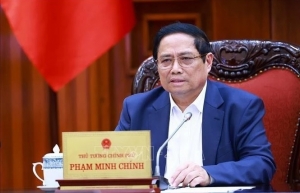Adjustments may be necessary for near-term gains
Do monetary policy and interest rates in 2024 need to be very flexible?
Economic challenges could persist in Q3 amid rising price pressures, VND weakness, and lacklustre global demand. At the same time, credit growth has been low, at 4.5 per cent year-to-date as of June 24, as many businesses reduce or halt operations, according to media reports.
Given these conditions, a flexible approach to the monetary policy and interest rates will be crucial. We expect the State Bank of Vietnam (SBV) to hike the refinancing rate by 50 basis points (bps) in Q4 in response to rising inflation. Additionally, USD/VND foreign exchange weakness supports our call for a hike in Q4 or earlier. Fed moves will also be key to the SBV’s policy decisions.
 |
| CEO of Standard Chartered Bank (Vietnam) Michele Wee |
What is the forecast for the SBV’s interest rates from now until the end of the year?
We expect the SBV to hike the refinancing rate by 50bps in Q4 in response to rising inflation. FX weakness supports our call for a hike in Q4 or earlier; Fed moves will also be key to the SBV’s policy decisions. We see greater price pressure this year than last year. June CPI rose 4.3 per cent on-year, marking the third month of inflation above 4 per cent.
Prices of education, housing and construction materials, healthcare, and food have driven inflation recently, a trend that could continue in the coming months. Pork prices and electricity cost rises were the main factors driving inflation higher in Q2. The government targets inflation between 4-4.5 per cent this year.
External fundamentals remain supportive of FX stability. Exports have recovered, but the strength of recovery remains to be seen amid a soft global outlook. Interest rate differentials and reserve rebuilding may continue to weigh on the VND. However, the central bank has stated it is intervening; this focus on FX may help increase currency stability.
What are the key non-interest rate measures to support the economy?
Non-interest rate measures to support the economy could include policies and incentives to boost foreign direct investment (FDI) and enhance trade. Disbursed FDI was up 8.2 per cent on-year to $11 billion in H1, while pledged FDI rose 13.1 per cent to $15 billion, driven by investments in the manufacturing and property sectors. Enhancing industrial output, which saw 8.7 per cent growth in H1, and maintaining robust export growth, which was 14.5 per cent on year, is crucial.
The ongoing reform in Vietnam aims to achieve an investment-grade rating and inclusion in the emerging-market index, alongside a focus on growth and stability. Successful achievement by 2030 and 2025 respectively will attract significant capital flows into the country.
The SBV’s support for the banking sector is essential. Structural reforms to improve administrative burdens, internal risk, governance controls, and guardrails around credit support, lending, and quality in the banking sector will further support economic stability.
Exchange rates in 2024 have fluctuated by nearly 5 per cent. What should businesses and banks do to hedge against exchange rate risks?
Exchange rate fluctuations can significantly impact businesses, especially those involved in import and export activities. The VND’s weakness amid a soft global outlook and interest rate differentials may continue to weigh on the currency.
Businesses should consider hedging strategies to mitigate exchange rate risks. This involves discussions with banks on relevant hedging strategies and risk appetites. The central bank’s interventions to stabilise the FX market may help increase currency stability.
The SBV will not implement monetary policy in isolation, as Fed moves will also be key to its decisions. Businesses should prepare for continued volatility as global central banks adjust their policies in response to changing economic conditions.
In the current domestic and international context, should Vietnam adjust the inflation target?
Given rising inflation trends, with June’s consumer price index rising 4.3 per cent on-year, marking the third month of inflation above 4 per cent, and prices driven up by factors like education, housing and construction materials, healthcare, and food, there is a case for reconsidering the inflation target.
The government targets inflation between 4-4.5 per cent this year. Adjusting the inflation target may be necessary to reflect current economic pressures and provide a more realistic framework for monetary policy. The ongoing reforms aimed at stabilising growth and maintaining economic stability also suggest that a reassessment of inflation targets could be beneficial in the current context.
 | PM chairs meeting on fiscal, monetary policy management Prime Minister Pham Minh Chinh chaired a meeting in Hanoi on May 16 with ministries and agencies to discuss the coordination of fiscal and monetary policies aimed at maintaining macroeconomic stability, controlling inflation and promoting growth. |
 | Steady ship anticipated for monetary policy to 2025 Despite an uncertain global economic environment, Vietnam’s overall macroeconomic situation is forecast to remain stable in the second half of 2024. Suan Teck Kin, head of research at UOB, shared with VIR’s Thuy Van the outlook of Vietnam’s economy and how the country positions itself to capitalise on opportunities for economic growth and investment. |
What the stars mean:
★ Poor ★ ★ Promising ★★★ Good ★★★★ Very good ★★★★★ Exceptional
Related Contents
Latest News
More News
- Banking sector targets double-digit growth (February 23, 2026 | 09:00)
- Private capital funds as cornerstone of IFC plans (February 20, 2026 | 14:38)
- Priorities for building credibility and momentum within Vietnamese IFCs (February 20, 2026 | 14:29)
- How Hong Kong can bridge critical financial centre gaps (February 20, 2026 | 14:22)
- All global experiences useful for Vietnam’s international financial hub (February 20, 2026 | 14:16)
- Raised ties reaffirm strategic trust (February 20, 2026 | 14:06)
- Sustained growth can translate into income gains (February 19, 2026 | 18:55)
- The vision to maintain a stable monetary policy (February 19, 2026 | 08:50)
- Banking sector faces data governance hurdles in AI transition (February 19, 2026 | 08:00)
- AI leading to shift in banking roles (February 18, 2026 | 19:54)

 Tag:
Tag:




















 Mobile Version
Mobile Version